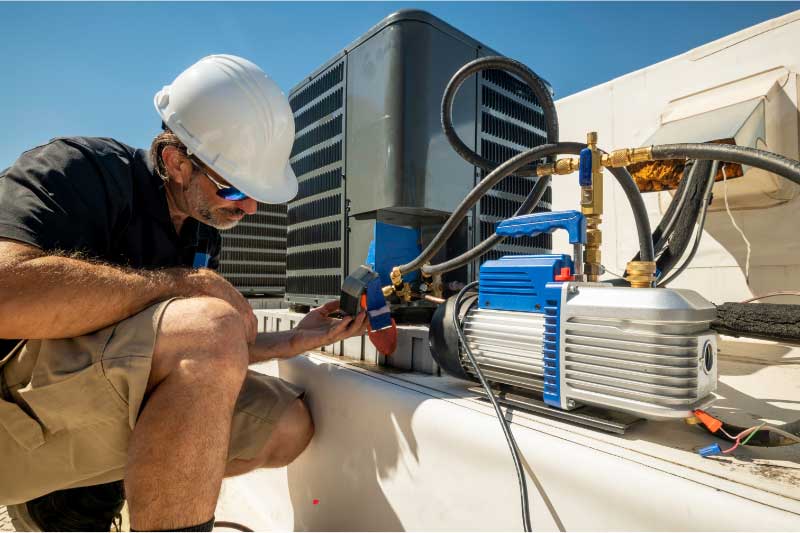Navigating the job market as an HVAC technician can feel overwhelming, especially if you’re just starting or looking to transition from another career. With the right skills highlighted on your resume, you can stand out from the crowd and land the job you want.
In this blog post, you’ll discover the top 15 important skills every HVAC technician should list on their resume. We’ll explore why these skills matter and how they can set you apart in the competitive HVAC field.
15 Important HVAC Technician Skills to List on Your Resume
Showcase your expertise with these 15 vital HVAC technician skills. Enhance your resume and boost your career prospects in the HVAC industry today!
Understanding HVAC Systems
An HVAC technician must understand how heating, ventilation, and air conditioning systems work. This knowledge forms the backbone of your career, enabling you to diagnose problems efficiently and offer effective solutions. Employers look for candidates who can demonstrate their comprehension of system components and their interactions.
Mastering HVAC systems involves both theoretical knowledge and practical experience. You’ll need to understand various types of systems, including split, ductless, and central systems. Each has its unique features and common issues, which you’ll need to be familiar with.
When listing this skill on your resume, consider highlighting any specific systems you’re particularly knowledgeable about. Mention any relevant certifications or courses you’ve completed to bolster your credibility.
Problem-Solving Abilities
Diagnosing and fixing issues quickly is crucial in HVAC work. Your problem-solving skills will help you identify the root cause of a malfunction and implement a solution efficiently. Employers value technicians who can think on their feet and handle unexpected challenges.
Problem-solving in HVAC often requires a blend of technical know-how and creative thinking. You may need to invent solutions when standard procedures don’t apply or when dealing with older systems lacking modern documentation.
Highlighting examples of past problem-solving experiences on your resume can make a significant impact. Be specific about the problems you faced, the steps you took to solve them, and the results you achieved.
Mechanical Aptitude
A natural knack for understanding how things work mechanically is invaluable in HVAC. This skill allows you to grasp complex machinery and troubleshoot issues effectively. Mechanical aptitude also means you’re comfortable using various tools and equipment.
Strong mechanical skills are essential because HVAC systems involve numerous moving parts. From compressors to fans, each component must function correctly for the system to operate efficiently. A technician who can diagnose mechanical failures quickly is a huge asset to any team.
To demonstrate this skill on your resume, mention any hands-on experience with mechanical systems. Highlight any relevant training or certifications that showcase your mechanical proficiency.
Electrical Knowledge
HVAC systems often include electrical components, making electrical knowledge a critical skill for technicians. Understanding how to work safely with electricity ensures you can install, repair, and maintain HVAC systems without risking injury or equipment damage.
Electrical knowledge includes wiring, circuit boards, and understanding voltage requirements for different components. Being able to read and interpret electrical schematics is also essential. This skill is especially important for diagnosing issues related to electrical failures in HVAC systems.
When listing this skill on your resume, include any specific electrical training or certifications you’ve completed. It can also be beneficial to mention your familiarity with different electrical components.
Customer Service Skills
Interacting with customers is a significant part of an HVAC technician’s job. Excellent customer service skills help you explain technical issues and provide exceptional service that satisfies clients.
Customer service in HVAC goes beyond just fixing problems. It involves listening to the customer’s concerns, providing clear and honest explanations, and ensuring they feel valued. Building a rapport with customers can lead to repeat business and referrals, which are crucial for career growth.
Highlighting your customer service skills on your resume can set you apart from other candidates. Mention specific instances where you went above and beyond to help a customer and discuss the positive outcomes.
Attention to Detail
Attention to detail is vital in HVAC work. Small mistakes can lead to significant problems, so being meticulous ensures everything is done correctly the first time. This skill helps you catch issues others might need to see and ensures high-quality work.
Attention to detail involves carefully following procedures, double-checking your work, and thoroughly inspecting. This skill is crucial for success, whether it’s ensuring all connections are secure or verifying that a system is operating within its specified parameters.
To highlight this skill on your resume, provide examples of how your attention to detail has benefited your previous employers. Discuss any specific projects where your meticulous approach led to successful outcomes.
Time Management
Efficient time management ensures you can complete jobs within the allotted schedule. Time management skills help you prioritize tasks, handle multiple jobs simultaneously, and meet deadlines without sacrificing quality.
Time management in HVAC work often involves balancing routine maintenance tasks with emergency repairs. Technicians who can effectively manage these demands are highly valued. It is also important to estimate job completion times accurately and communicate these to clients.
Include any experiences on your resume where you successfully managed multiple tasks or projects. Highlight your ability to meet deadlines consistently and any strategies you use to stay organized.
Communication Skills
Clear communication is essential for HVAC technicians. You must explain complex technical information to clients, collaborate with team members, and write detailed reports. Strong communication skills make you more effective and professional.
Effective communication includes both verbal and written skills. You’ll need to clearly articulate issues and solutions to clients needing more technical backgrounds. Writing clear and concise reports ensures that all necessary information is documented and accessible.
When detailing this skill on your resume, mention any relevant experiences where your communication skills made a difference. Discuss how you’ve handled difficult conversations or explained complex issues in an easy-to-understand manner.
Physical Stamina and Strength
HVAC work can be physically demanding. Technicians often need to lift heavy equipment, work in cramped spaces, and endure various weather conditions. Physical stamina and strength are essential for performing these tasks safely and effectively.
Physical stamina also means being able to work long hours when necessary, especially during peak seasons. Maintaining good physical health ensures you can handle the job’s demands without injury.
On your resume, mention any experiences that demonstrate your physical capabilities. Include these if you’ve completed physically demanding projects or have workplace safety and ergonomics certifications.
Technical Skills
Being proficient with a variety of tools and technology is crucial in HVAC. Technical skills enable you to use specialized equipment, software, and diagnostic tools effectively. Staying updated with the latest technology trends in HVAC can give you a competitive edge.
Technical skills include using multimeters for electrical testing, understanding HVAC software for diagnostics, and being proficient with hand and power tools. Adapting to new technologies and tools is also important as the industry evolves.
Highlight any specific technical skills or tools you’re proficient with on your resume. Mention any relevant training or certifications that showcase your technical expertise.
Safety Awareness
Safety is paramount in HVAC work. Technicians must know potential hazards and follow safety protocols to prevent accidents. This skill ensures you can perform your job without risking your health or the safety of others.
Safety awareness includes understanding the proper use of personal protective equipment (PPE), following safety guidelines for handling refrigerants and being aware of electrical hazards. It is also important to regularly update one’s knowledge of safety standards.
Include any safety training or certifications you have on your resume. Highlight any instances where your adherence to safety protocols prevented accidents or ensured a safe working environment.
Adaptability
The HVAC field constantly evolves, with new technologies and methods emerging regularly. Being adaptable means you can quickly learn and apply new skills, ensuring you stay relevant in your career. Employers value technicians who can adjust to changes seamlessly.
Adaptability involves being open to new ideas, willing to undergo additional training, and being flexible in problem-solving. This skill ensures you can handle unexpected challenges and continue to provide high-quality service.
Mention any experiences on your resume where you successfully adapted to new situations or technologies. Discuss how your adaptability has benefited your previous employers.
Teamwork
Working well with others is essential in HVAC. Many jobs require collaboration with other technicians, contractors, or clients. Strong teamwork skills ensure projects run smoothly and efficiently.
Teamwork involves clear communication, reliability, and the ability to work towards a common goal. It’s important to share knowledge, help others when needed, and contribute positively to the team dynamic.
Highlight any team-based projects or collaborations on your resume. Discuss how your contributions helped achieve successful outcomes and any positive feedback you’ve received from team members.
Diagnostic Skills
Accurate diagnostics are crucial for effective HVAC repairs. Strong diagnostic skills enable you to identify problems quickly and accurately, minimizing downtime and ensuring efficient solutions.
Diagnostic skills involve using tools and technology to test and analyze HVAC systems. Interpreting diagnostic results and determining the best course of action is also important. Continuous learning and practice are key to honing these skills.
On your resume, mention any specific diagnostic tools you’re proficient with. Provide examples of complex issues you’ve successfully diagnosed and repaired.
Organizational Skills
Keeping track of tools, parts, and paperwork is essential for efficient HVAC work. Strong organizational skills help you stay on top of your tasks and ensure nothing is overlooked.
Organizational skills involve maintaining an orderly workspace, keeping accurate records, and managing inventory effectively. Being organized ensures you can quickly access the tools and information you need, reducing downtime.
Highlight any experiences where your organizational skills made a significant impact. Discuss how you’ve implemented systems or processes to improve efficiency.
Conclusion
Listing the right skills on your resume is essential for standing out in the competitive HVAC job market. By showcasing your expertise in areas like system understanding, problem-solving, and customer service, you can demonstrate your value to potential employers.
Ensure your resume reflects not only your technical abilities but also your soft skills, such as communication and teamwork. These skills are just as important for positively impacting your role.
Ready to elevate your HVAC career? Start by updating your resume with these essential skills, and watch as new opportunities unfold. Explore our blog and connect with industry experts for more tips and resources on advancing your HVAC career.





